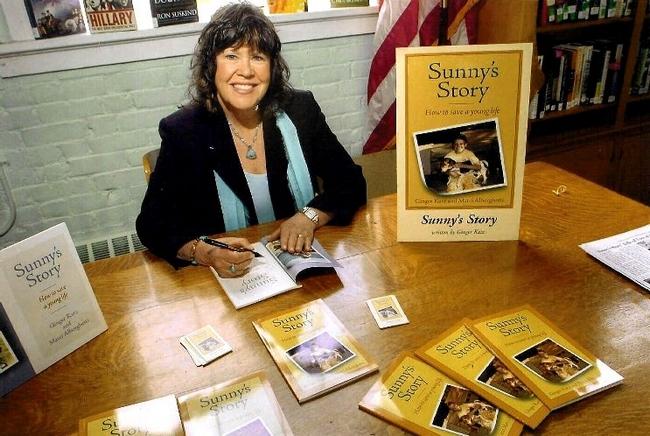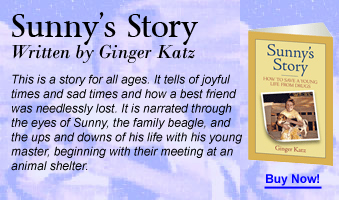
Burlington High School parents attend ‘Courage to Speak’ drug addiction prevention presentation

Ginger Katz, founder of the Courage to Speak Foundation, spoke to parents at Burlington High School Sept. 17. Katz recently wrote a 40-page book that takes 26 minutes to read for all ages called, “Sunny’s Story,” which is about the needless loss of a best friend as told by the family beagle. Several parents in attendance asked Katz to autograph their copies. COURTESY PHOTO
By Chris Warren
![]() Posted Sep. 25, 2015 at 5:23 PM
Posted Sep. 25, 2015 at 5:23 PM
BURLINGTON
When Ginger Katz took the stage at Burlington High School Sept. 17, she started by saying her son Ian died Sept. 10, 1996, due to an overdose of heroin mixed with Valium. He was 20 years old.
To save face, Ian’s doctor suggested Katz tell people her son had died of an aneurysm. Instead, she told the truth.
Ian was a star lacrosse player in high school who went on to college. He began to dabble in drugs in the eighth grade. By his senior year of high school, drugs had taken over his life and led to a downward spiral from which he would never recover.
“He was a good kid who made an unhealthy decision. I’ve never been ashamed of him and I am not going to bury him with a lie,” said Katz.
She and her husband (Ian’s stepfather) Larry Katz formed The Courage to Speak Foundation shortly after Ian’s death. She gave her first presentation in 1997 at Norwalk High School in Connecticut, where Ian had graduated a few years earlier.
Since then, Katz has presented Ian’s story and her experience as his mother, along with tips and advice for parents and teens at more than 1,000 venues across the country. She was at Burlington High School to speak to parents as part of the annual Back-to-School Night and the following morning to BHS students.
After Ian’s funeral, many of his friends visited Katz at her home. Many described him as bright, sensitive, deep and thoughtful. He was smart, good-looking, had a charming and outgoing personality and was athletic and well-liked by his peers.
When Ian was in the eighth grade, he came home one day and Katz smelled tobacco on his breath. She questioned him and he told her he “had smoked a cigarette.” He told her he didn’t even like it and wouldn’t do it again.
During his freshman year of high school, he and two other boys were stopped by the police and marijuana was found in the car. Ian told her the marijuana wasn’t his and belonged to one of the other boys.
During his junior year, Katz saw a change in Ian’s personality. He no longer had any interest in sports, and the friends he hung out with changed.
By the time Ian was a senior, he was struggling to focus and graduate high school. The summer between high school and college was particularly difficult.
“I was losing control of my home. He was angry, bringing people, mostly girls, in while I wasn’t at home, breaking the rules of the house,” Katz said.
She found out from one of Ian’s friends, after the funeral, that Ian had been smoking marijuana laced with PCP that summer, a substance known to bring out violent tendencies in people.
Ian then went on to study at the University of Hartford. One night, Katz got a call from one of his college friends to inform her that Ian was in the hospital because he had been hit over the head with a beer bottle and needed 17 stitches.
The school suspended Ian and the student that threw the beer bottle for five weeks.
“That other boy was picked up by his father, never to see the university again,” Ginger said. “Ian’s biological father, doing the best he knew, talked to the dean and pleaded with him to give Ian community service instead.”
In retrospect, Katz said she, Larry and Ian’s father unwittingly enabled him by letting him off the hook too easily.
During Ian’s sophomore year of college, he and two other boys tried heroin.
“The dealers know these kids won’t use needles, so they give them packets of the stuff to snort or smoke. One boy got scared, one boy got sick and one got hooked. The one that got hooked was Ian,” Katz said.
Ian overdosed within five months, despite extensive counseling the summer before he died and being admitted to a drug rehab center.
Katz said that a typical reaction from parents when they find out about their child’s drug use is to retreat and blame themselves, thinking the drug use is a result of bad parenting or traumatic experiences, such as a divorce. She went to counseling and support groups as Ian’s drug use intensified and found out she “didn’t cause it, can’t cure it and can’t control it.”
At the end of the presentation that was attended by approximately 150 Burlington parents, Ginger and Larry Katz offered some advice.
· Talk to children often about the dangers of drugs, including alcohol, and not using them.
· Search your children’s rooms. “Your name is on the deed or on the lease, so you have a right to search their rooms,” Ginger said. “Your job as a parent is to keep your kids safe.”
· Keep talking to your children and keep the communication lines open. If communication is not easy, they both suggested, “Drive your kid and their friends somewhere. You’ll learn a lot about your child by listening to the conversations.”
They also mentioned their foundation offers a Courageous Parenting 101 online course for people in the field to facilitate to parents and bring back to their community.
“Your child needs you more in high school than they ever did,” said Katz.
For information, go to couragetospeak.org.





